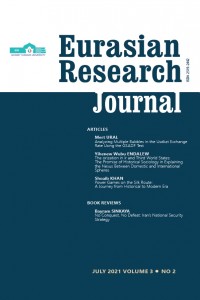THEORIZATION IN IR AND THIRD WORLD STATES: THE PROMISE OF HISTORICAL SOCIOLOGY IN EXPLAINING THE NEXUS BETWEEN DOMESTIC AND INTERNATIONAL SPHERES
Abstract
Until alternative theories that sought a serious consideration of third world states in International Relations (IR) proliferated in the last quarter of the 20th century, knowledge production remained monopolized by dominant Western-centered theories. Historical Sociology in International Relations (HSIR) is one of the approaches that aimed at directing IR towards more inclusive inquiries that acknowledge temporal and spatial variance; especially against ahistorical and ‘asociological’ foundations of Neorealism. Despite this motivation, most of the studies and debates within HSIR are concentrated on illustrating the approach’s applicability in the study of Western states. Through a review of the available literature, this paper aims to demonstrate the promise of HSIR in explaining the relationship between domestic and foreign affairs of third world states. To achieve this objective, the paper mainly draws from the works of John Hobson and Fred Halliday and suggests the incorporation of third world states in the inquiries and debate within HSIR.
Keywords
International Relations Theory Historical Sociology Third World States Domestic Domain International Domain
References
- Acharya, Amitav and Barry Buzan (2010). “Why is there no non-western international relations theory? An introduction an introduction?”, In Amitav Acharya and Buzan Barry (Eds.). Non-Western International Relations Theory: Perspectives on and Beyond Asia. New York: Routledge.
- Berger, Mark (2000). “Specters of colonialism: Building post-colonial states and making modern nations in the Americas”. Latin American Review 35(1): 151-171.
- Chernoff, Fred (2007). Theory and Metatheory in International Relations: Concepts and Contending Accounts. New York: Palgrave Macmillan.
- Chipaike, Ronald and Matarutse H. Knowledge (2018). “The Question of African Agency in International Relations”. Cogent Social Sciences, 4(1): 135- 152.
- Clapham, Christopher (1996). Africa and the International System: The Politics of State Survival. Cambridge: Cambridge University Press. Frank, Andre G. (1978). Dependent Accumulation and Underdevelopment. New York: New York University Press.
- Fukuyama, Francis (1989). “The end of history?” The National Interest No. 16, pp. 3-18.
- Halliday, Fred (1990). Revolution and Foreign Policy: The Case of South Yemen 1967-1987. Cambridge: Cambridge University Press.
- Hobson, John (1998). “The historical sociology of the state and the state of historical sociology in international relations.” Review of International Political Economy 5(2): 284-320
- Halliday, Fred (1994). Rethinking International Relations. London: Macmillan.
- Halliday, Fred (1999). Revolution and World politics: The Rise and Fall of the Sixth Great Power. Lomdon: Macmillan.
- Halliday, Fred (2005). The Middle East in International Relations: Power, Politics and Ideology. Cambridge: Cambridge University Press.
- Hobson, John (2002). “What is at stake in bringing historical sociology into international relations’? Transcending ‘Chronofetishism’ and ‘Tempocentrism’ in international relations”. In John Hobson and Stephen Hobden (Eds.). Historical Sociology of International Relations. Cambridge: Cambridge University Press.
- Hobson, John M. (2012). The Eurocentric Conception of World Politics: Western International Theory, 1760–2010. Cambridge: Cambridge University Press.
- Hobson, John and Stephen Hobden (2002). “On the road towards a historicized world sociology”. In John Hobson and Stephen Hobden (Eds.). Historical Sociology of International Relations (265-285). Cambridge: Cambridge University Press.
- Jackson, Richard (1990). Quasi-States: Sovereignty, International Relations, and the Third World. Cambridge: Cambridge University Press.
- Jackson, Robert and Georg Sorensen (2013). Introduction to International Relations Theories and Approaches. Oxford: Oxford University Press.
- Lawson, George (2007). “Historical sociology in international relations: Open society, research program and vocation”. International politics 44(4): 343-368.
- Lawson, George (2006). “The promise of historical sociology in international relations”. International Studies Review 8(3): 397-423.
- Ofuho, Cirino (2009). “Africa: Teaching IR where it’s not supposed to be”, in international relations scholarship around the world”. In Tickner, Arlene and Ole Waever (Eds.). International Relations Scholarship around the World (71-85). London: Routledge.
- Rodney, Walter. 2018. How Europe Underdeveloped Africa. London: Verso Books.
- Said, Edward W. (2003). Orientalism. London: Penguin.
- Teschke, Benno (2011). “Advances and impasses in Fred Halliday’s international historical sociology: A critical appraisal”. International Affairs 87(5): 1087- 1106.
- Tomlinson, Tom B. R. (2003). “What was the Third World?” Journal of Contemporary History 38(2): 307-321.
- Wallerstein, Immanuel (1991). The Politics of World-Economy: The States, Movements, and the Civilizations. Cambridge: Cambridge University Press.
- Waltz, Kenneth (1979). Theory of International Politics. Berkley: Addison-Weley.
Details
| Primary Language | English |
|---|---|
| Subjects | International Relations |
| Journal Section | Research Articles |
| Authors | |
| Publication Date | July 30, 2021 |
| Published in Issue | Year 2021 Volume: 3 Issue: 2 |


